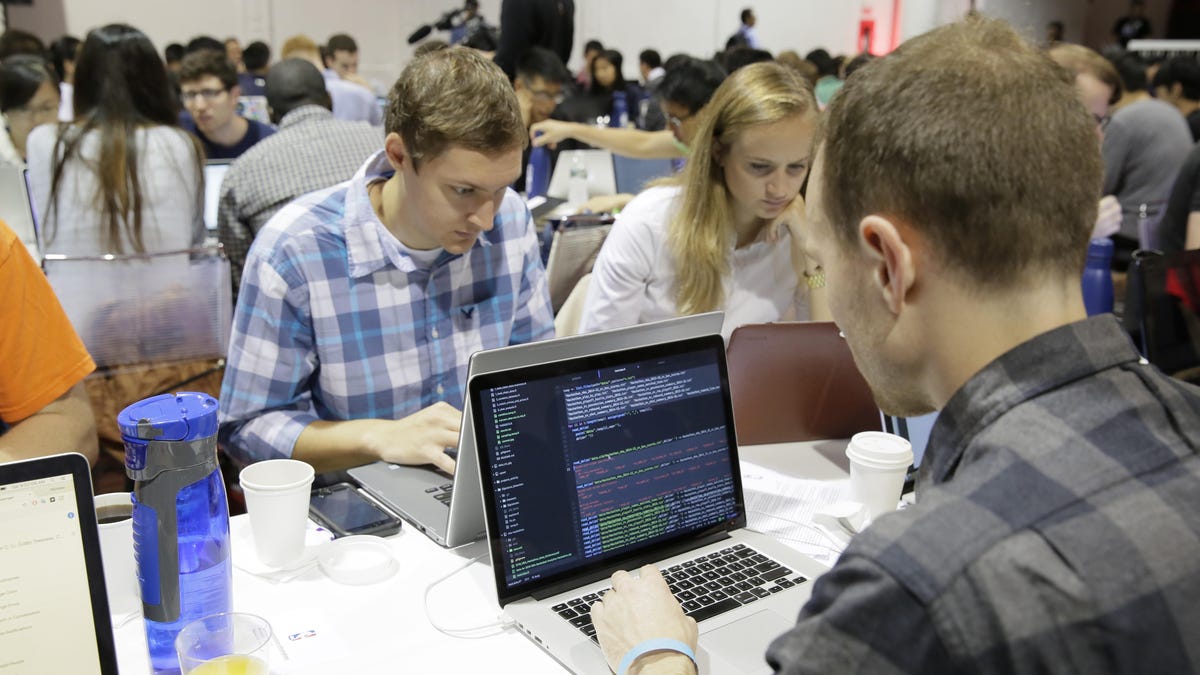Wanted: Sharp(shooting) minds for NBA's second hackathon
The league expands its contest to two days, so teams can work longer to create new basketball and business analytics.

Students, statisticians, developers and engineers work furiously during the 2016 NBA Hackathon.
Think you have the wits to hack it in the NBA?
The league has started recruitment for its second annual NBA Hackathon on September 23 and 24 in New York City. Undergrads on up, as well as engineers and developers across the US and Canada, will work in teams during the event to create new basketball and business analytics, the league said Wednesday.
The NBA's second hackathon comes as teams across pro sports are obsessing over analytics and stats to help them on and off the court. In the NBA's case, teams are seeking to mimic the Golden State Warriors, the tech-savvy squad that earlier this month won its second championship in three years.
How important is analytics, a fancy term for the systematic analysis of data? Well, NBA Coach of the Year Mike D'Antoni of the Houston Rockets -- whose "space-and-pace" offense led by MVP candidate James Harden set an NBA record for the most 3-pointers made in a single season with 1,181 -- has gone out of his way to thank the "analytics guys, who kinda explained why I'm not totally crazy."
At last year's hackathon, more than 200 students in 60 teams from 53 universities participated. Instead of getting eight hours to compete, this year the teams will have 24 hours to create projects to present to a panel of NBA execs, professors and the media.
The goal with the longer session is to raise the bar higher, said Jason Rosenfeld, the NBA's director of basketball analytics.
"We're giving these students rich, raw data that's not publicly available on any platform," he said. "It's going to take them a lot of time to get their arms around it, and we think the more time they have, the better they will do toward completing their projects."
A handful of hackathon participants from last year have been hired across the league as interns and analysts, Rosenfeld added.
The grand prize for winning the hackathon includes a trip to the 2018 NBA All-Star weekend in Los Angeles and lunch with NBA Commissioner Adam Silver.
Last year's winning team with members from Columbia Univeristy, New York University and Pace University focused on the concept of "Hero Ball."
The students found that star players on teams tend to play more selfishly during the playoffs, much to the detriment of their offense.
One exception to that "rule" was LeBron James taking games over to lead his Cleveland Cavaliers to its first NBA title in 2016. With this year's NBA MVP Russell Westbrook of the Oklahoma City Thunder becoming the second player to average a triple-double for the entire season, the "Hero Ball" theory will likely be challenged during this year's hackathon.
CNET en Español: Get all your tech news and reviews in Spanish.
Technically Incorrect: Bringing you a fresh and irreverent take on tech.

